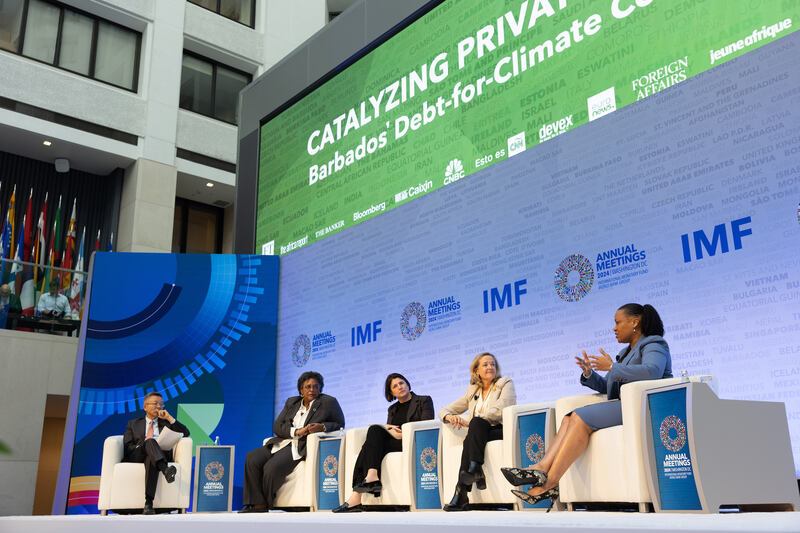Column: Debt Swap, IMF & Climate Solutions
[Column written by Patrice Horner]
The Government of Barbados completed an innovative “Debit for Climate Conversion” with the International Monetary Fund [IMF], along with Inter-American Development Bank [IBD], the European Investment Bank [EIB], and the Caribbean Investment Bank [CIB]. The IMF established the Resiliency and Sustainability Trust Fund [RST] as the first ‘long-term’ lending facility with 10-20 year terms of concessional funds to provide countries scope for climate sustainability as well as pandemics. A climate roundtable was held in Barbados. It was followed with the launch of a Blue-Green Bank, using the fiscal space from RST to seed the climate finance initiative.
Barbados has been under a timeline to bring down their debt. IMF helped to stabilize the economy and to move toward progressive growth. The timeline for developing reliance is shorter. Increasing resilience is an important feature for Development Banks. From drought to rain, water has been the greatest challenge for Barbados. Barbados is a fresh- water scare country. By managing sewage and using reclaimed water, there will be more water for irrigation. Reduction in marine and groundwater pollution will help protect marine ecosystems and nearshore reefs, as well as improve groundwater quality. Investment in infrastructure is needed.
IMF Deputy Managing Director Bo Li, Barbados Prime Minister Mia Mottley, Inter-American Development Bank VP Ana María Ibáñez, European Investment Bank President Nadia Calviño, and CIBC Caribbean Bank Managing Director Donna Wellington at the October 2024 Annual Meetings of the World Bank Group and International Monetary Fund in Washington, DC.
The European Investment Bank and Caribbean Investment Bank are repurposing the Barbadian Debt overhang to transformative growth at a reduced rate. It will provide $125 million in savings. The savings will fund new tools beyond nature conservation typically associated with Green Bonds. Adaptation and mitigation will be created with renewable energy and infrastructure improvements. The initial project will be used for water resource management to enhance water and food security.
The private sector participated in the financing structure. CIBC Caribbean was the lead loan arranger through a Sovereign Sustainability Linked Loan [SSLL] in October 2024. The loan was backed with a $300 million guarantee, from the Inter-American Development Bank [IBD] and the European Investment Bank [EIB]. The EIB acted under the European Union’s Global Gateway Initiative. The Global Gateway stands for sustainable and trusted connections that work for people and the planet. With the guarantees, CIBC arranged a local currency loan with regional banks participating.
The IBD and the Green Climate Fund [GCF] are providing $110 million upfront capital, including a $40 million grant. The Grants, guarantees, and concessional loans were all part of the financial solution. The arrangement also includes sustainability targets, relating to the volume and quality of reclaimed water regenerated. If the targets are not met, a financial penalty will be paid into the Barbados Environmental Sustainability Fund. A second-party authorizer reviewed the financing framework and affirmed alignment with international best practices, with strong Key Performance Indicators and ambitious Sustainability Performance Targets [SBI].
The debt for finance resilience swap was announced at the IMF Annual Meetings in Washington DC in early December. It represents a 5-7 times leverage of normal capacity. It is a partnership of a number of Development Banks along with Public to Private engagement. It is a blueprint for how to engage each others’ value-add for Common Good. Lower-risk rated assets from Development Banks reduced the hurdle to support the sustainability linked lending. From an International Financial Reported Standard [IFRS] standpoint, it is risk weighted capital.
- Patrice Horner, MBA, EFA
Read More About
Category: All


